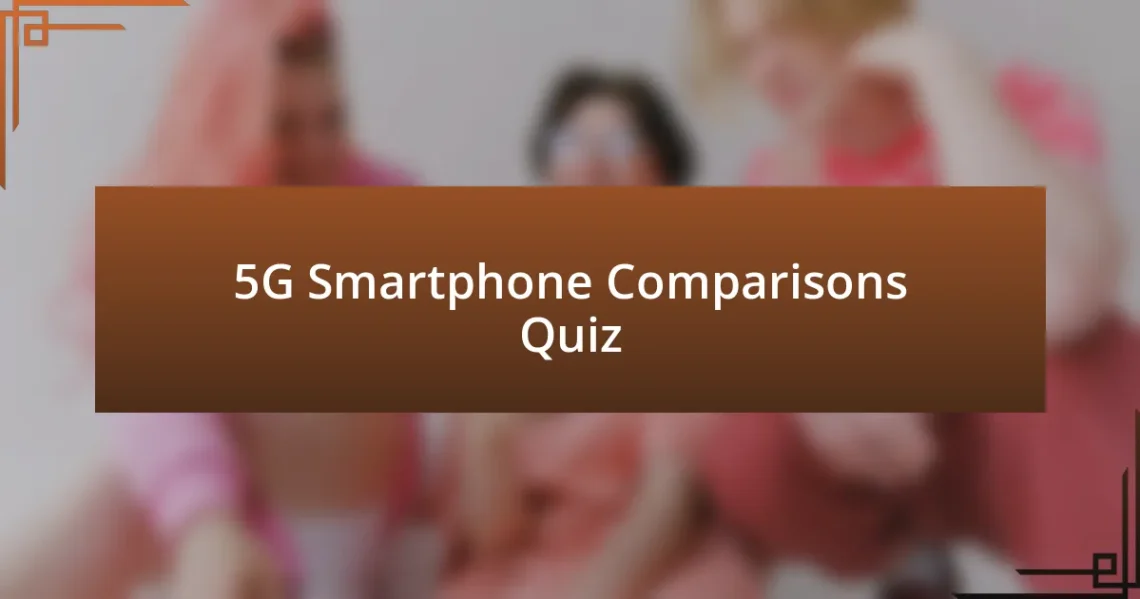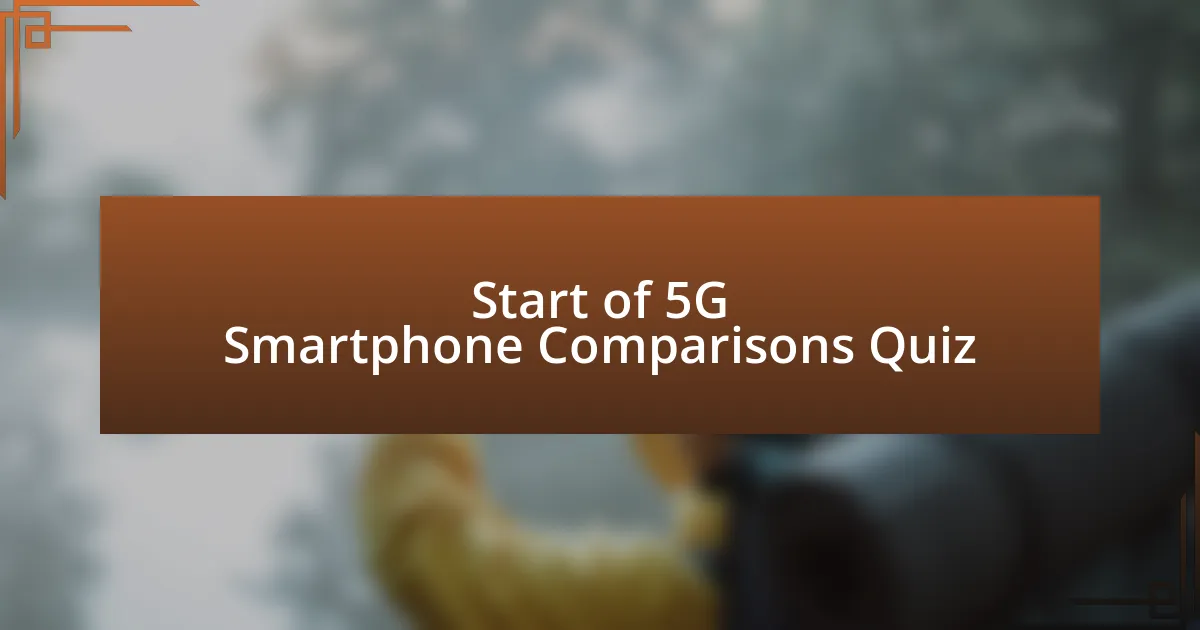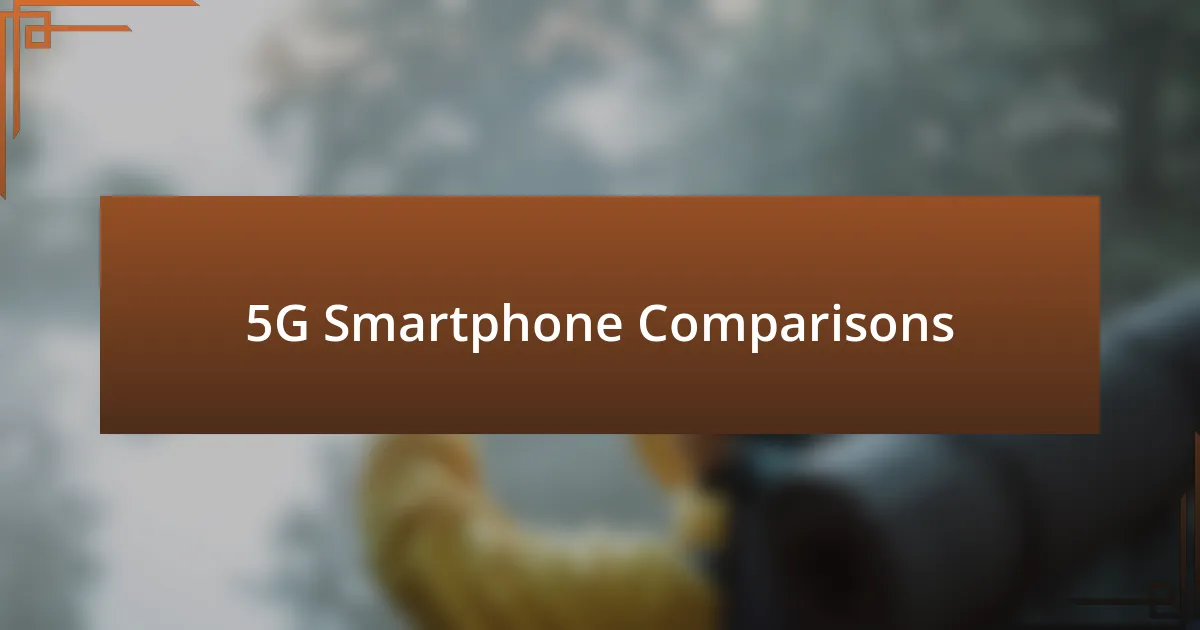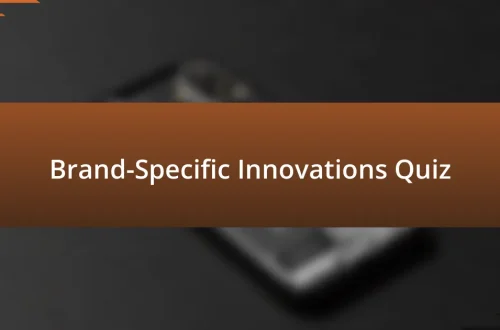
5G Smartphone Comparisons Quiz

Start of 5G Smartphone Comparisons Quiz
1. What is the primary technology behind 5G smartphones?
- Wi-Fi technology
- 5G technology
- 4G technology
- Bluetooth technology
2. Which smartphone models are known for their 5G compatibility?
- Galaxy S20
- Galaxy S21
- Galaxy S24
- Galaxy S22
3. How does 5G technology improve streaming experiences on smartphones?
- 5G provides larger battery life for devices.
- 5G offers faster speeds and greater bandwidth.
- 5G limits the number of connected devices.
- 5G increases the cost of streaming services.
4. What role do modem chipsets play in 5G smartphone performance?
- Modem chipsets process the audio output of 5G smartphones.
- Modem chipsets enhance the physical durability of 5G smartphones.
- Modem chipsets control the camera functions of 5G smartphones.
- Modem chipsets manage the data connectivity of 5G smartphones.
5. Why might consumers prefer 5G smartphones over LTE models?
- 5G is only for gaming and media streaming.
- 5G offers faster speeds and greater bandwidth compared to LTE models.
- 5G smartphones can only be used in urban areas.
- 5G decreases connectivity between devices.
6. What is the significance of low latency in 5G smartphones?
- It provides a wider range of social media apps.
- It enables real-time applications like remote surgery.
- It improves battery life significantly.
- It enhances camera quality for selfies.
7. How do manufacturers measure the 5G performance of their devices?
- Through various network tests and benchmarking tools.
- By measuring the device`s physical weight and dimensions.
- By analyzing battery consumption during calls.
- Based on user interface experience and app performance.
8. In what ways can 5G smartphone features benefit enterprise users?
- Enhanced connectivity and faster data transfer
- Limited range and fewer connected devices
- Reduced battery life and slower performance
- Higher costs and more maintenance requirements
9. How does the geographic availability of 5G impact smartphone sales?
- Smartphone sales are unaffected by network speed improvements.
- Increased 5G network availability boosts smartphone sales.
- Limited 5G coverage decreases smartphone sales significantly.
- 5G network availability has no impact on smartphone sales.
10. What should users consider regarding signal strength when choosing a 5G smartphone?
- The camera megapixel count of the device.
- The color options available for the smartphone.
- The availability and quality of 5G networks in the user`s area.
- The brand of the smartphone being purchased.
11. How does the Samsung Galaxy S24`s performance compare to its predecessors in 5G capabilities?
- The Galaxy S24 has 5G speeds about 10 Mbps slower than the S23 models.
- The Galaxy S24`s 5G speeds are unchanged from the S22 models.
- The Galaxy S24 has slower 5G speeds than the S22 models.
- The Galaxy S24 has 5G speeds about 75 Mbps faster than the S22 models.
12. What factors influence the cost of 5G smartphones?
- Smartphone specifications and features
- The color of the smartphone
- The country of origin of the smartphone
- The brand name of the manufacturer
13. How do network congestion issues affect 5G smartphone users?
- Network congestion has no effect on 5G smartphone users.
- Network congestion can cause slower speeds and increased latency for 5G users.
- Network congestion boosts call quality for 5G users.
- Network congestion improves download speeds for 5G users.
14. What comparisons exist between 5G smartphone battery consumption and LTE devices?
- 5G devices consume no battery due to efficient technology.
- 5G devices and LTE devices have the same battery consumption.
- 5G devices consume less battery than LTE devices.
- 5G devices can consume more battery than LTE devices.
15. Which brands currently lead in the 5G smartphone market?
- Samsung
- Nokia
- LG
- Blackberry
16. What technological advancements are necessary for optimizing 5G smartphone functions?
- Increased screen resolution
- Smaller battery size
- Improved chipset efficiency
- Basic software updates
17. How do user demands shape the development of 5G smartphones?
- User preferences dictate pricing strategies.
- User feedback influences smartphone features and design.
- User concerns focus solely on battery life.
- User trends have no effect on smartphone development.
18. What types of applications most benefit from 5G speed enhancements?
- Remote surgery
- Word processing
- Email communication
- Basic web browsing
19. What is a common misconception about 5G smartphone technology?
- 5G is only for gaming.
- 5G works the same in every location.
- 5G uses only high-band frequencies.
- 5G requires special wiring in homes.
20. How can users determine if their current smartphone is 5G capable?
- Examine the camera resolution.
- Check if the phone is waterproof.
- Check the specifications for 5G support.
- Look for a larger screen size.
21. What testing methods are used to evaluate 5G download speeds?
- Speedy Analytics
- QuickMeasure Test
- Ookla Speed Test
- FastTrack Evaluation
22. How does 5G affect the overall user experience for gamers on smartphones?
- 5G slows down connection speeds, making gaming less enjoyable.
- 5G reduces latency and improves connectivity for seamless gaming experiences.
- 5G increases ping, causing lagging issues for gamers.
- 5G has no impact on gaming; it is the same as 4G.
23. What future developments are expected in 5G smartphone technology?
- 5G will only support traditional voice calls without any enhanced features.
- 5G technology will eliminate the need for any network infrastructure upgrades.
- 5G devices will have significantly longer battery life compared to 4G devices.
- 5G`s low latency will enable new applications, such as remote surgery and virtual and augmented reality.
24. What features differentiate high-end 5G smartphones from budget models?
- Budget models include exclusive AI-driven features and 6G support.
- High-end models have smaller batteries and less storage capacity.
- High-end models offer superior camera systems and premium materials.
- Budget models feature foldable screens and high refresh rates.
25. How can software optimization improve 5G performance on smartphones?
- Optimizing software makes smartphones look better visually.
- Optimizing software can enhance data processing efficiency.
- Software improvements can prevent physical damage to devices.
- Software updates can increase battery life significantly.
26. What are the typical data plans available for 5G smartphone users?
- Single-use prepaid plans with limited 4G access
- Restricted family plans with no 5G support
- Seasonal data plans for occasional users
- Unlimited data plans with high-speed 5G access
27. How does network infrastructure impact the effectiveness of 5G smartphones?
- Network infrastructure determines the reliability and speed of 5G performance.
- Network infrastructure has no effect on 5G device performance.
- Network infrastructure solely influences the size of 5G smartphones.
- Network infrastructure improves battery life of 5G smartphones.
28. What marketing strategies are used to promote 5G smartphones?
- Influencer partnerships and social media campaigns
- Televised sports events and in-person demos
- Direct mailers and billboard placements
- Radio advertisements and print media
29. What are the implications of 5G technology for smart home integration through smartphones?
- 5G reduces the need for Internet of Things devices in smart homes.
- 5G enhances smart home integration by enabling faster communication between devices and smartphones.
- 5G limits the number of devices that can connect to a smartphone.
- 5G technology slows down the performance of smart home devices.
30. How do consumer reviews influence the perception of 5G smartphone models?
- Positive reviews can increase consumer trust in 5G smartphones.
- Reviews only affect the price of 5G smartphones.
- Negative reviews have no impact on consumer trust.
- Consumer reviews are ignored by most buyers.

Congratulations on Completing the Quiz!
Thank you for participating in our quiz on 5G smartphone comparisons. We hope you found it both informative and enjoyable. By testing your knowledge, you’ve explored features, performance, and connectivity options of various 5G devices. Each question was designed to enhance your understanding of this rapidly evolving technology.
Throughout the quiz, you likely discovered key differences between popular models. You learned about their capabilities, strengths, and weaknesses. Understanding these aspects is essential when considering your next smartphone purchase. The insights gained here can help you make informed choices that suit your needs and lifestyle.
For even more in-depth knowledge, we invite you to check the next section on this page dedicated to 5G smartphone comparisons. You’ll find detailed articles and resources that will further your understanding of these devices. Expanding your knowledge will empower you to navigate the world of 5G technology confidently.

5G Smartphone Comparisons
Introduction to 5G Smartphones
5G smartphones are mobile devices that utilize the fifth generation of wireless technology. This technology offers faster data speeds, lower latency, and improved connectivity compared to previous generations. 5G smartphones are designed to support diverse applications, including streaming, gaming, and smart device integration. Major manufacturers have begun releasing models with 5G capabilities, demonstrating the demand for enhanced mobile experiences. The adoption of 5G technology marks a significant evolution in mobile communication, reflecting a shift towards smarter, more connected devices.
Key Features in 5G Smartphone Comparisons
When comparing 5G smartphones, several key features should be considered. These include network compatibility, processor performance, camera quality, battery life, and display technology. Network compatibility pertains to the supported frequency bands and carrier-specific 5G networks. Processor performance impacts the device’s ability to handle tasks efficiently. Camera quality influences photography and videography capabilities. Battery life determines how long the device can operate under 5G usage. Display technology affects the visual experience, especially for gaming and streaming. Understanding these features is essential for making informed purchasing decisions.
5G Smartphone Brands and Models
Several prominent brands are leading the market in 5G smartphone offerings. Companies like Apple, Samsung, Google, and OnePlus have released models featuring advanced 5G technology. For example, the iPhone 13 series, Samsung Galaxy S21, Google Pixel 6, and OnePlus 9 all support 5G connectivity. Each model varies in terms of specifications, pricing, and design philosophy. This diverse range allows consumers to choose devices that best fit their needs and preferences, highlighting the competitive nature of the 5G smartphone market.
Performance Metrics in 5G Smartphone Comparisons
Performance metrics are crucial when comparing 5G smartphones. Key metrics include download and upload speeds, processing speed, and multitasking capabilities. Download speeds can significantly enhance streaming and gaming experiences, while upload speeds affect content sharing. Benchmark tests, such as Geekbench and AnTuTu, measure processing speed and overall performance. Multitasking capabilities can be gauged through user experience under heavy application loads. These metrics provide valuable insights into how well a 5G smartphone performs in real-world scenarios.
Price Range and Value in 5G Smartphones
The price range of 5G smartphones varies widely, influenced by features, brand reputation, and market positioning. Entry-level models may start around $300, while flagship devices can exceed $1,200. Evaluating value involves considering features relative to cost. Mid-range smartphones often provide a balanced combination of performance and affordability. High-end models offer cutting-edge technology but at a premium price. Understanding this relationship helps consumers select devices that deliver the best value based on their specific needs and budget.
What are the main features to compare in 5G smartphones?
The main features to compare in 5G smartphones include processor performance, battery life, camera quality, display resolution, and 5G connectivity capabilities. For example, smartphones may use different processors, like Qualcomm Snapdragon or Apple’s A-series chips, which influence speed and efficiency. Additionally, a typical 5G smartphone should support both sub-6GHz and mmWave bands to utilize different 5G coverage options effectively.
How does 5G impact smartphone performance?
5G significantly enhances smartphone performance by offering higher data speeds, lower latency, and improved connectivity. For instance, 5G can provide download speeds exceeding 1 Gbps, which is substantially faster than 4G LTE speeds. This capability allows for quicker app downloads, seamless streaming, and enhanced user experiences, particularly in data-intensive applications.
Where can consumers find reliable 5G smartphone comparisons?
Consumers can find reliable 5G smartphone comparisons on technology review websites, such as GSMArena or CNET, as well as in tech sections of major publications like The Verge or TechRadar. These platforms typically conduct side-by-side assessments based on performance metrics, user reviews, and expert analysis, ensuring detailed and factual comparisons.
When did 5G smartphones first become popular?
5G smartphones first became popular in 2019 with the launch of devices like the Samsung Galaxy S10 5G and the OnePlus 7 Pro. These models marked the initial wave of commercial 5G smartphones, coinciding with the rollout of 5G networks in several countries, which sparked consumer interest in the technology.
Who are the major manufacturers of 5G smartphones?
The major manufacturers of 5G smartphones include Samsung, Apple, Huawei, Xiaomi, and OnePlus. Each of these companies offers multiple models that support 5G technology, catering to various market segments, from budget to premium devices. For instance, Samsung’s Galaxy series and Apple’s iPhone 12 series are well-known for their 5G capabilities.




